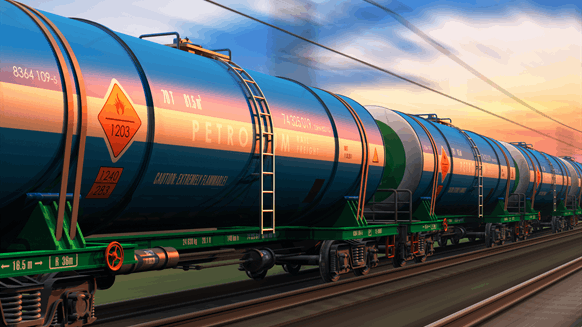LNG Expands Reach Through Virtual Pipelines

There is a growing worldwide opportunity to meet the needs of customers located beyond their country’s gas pipeline grid with virtual pipelines, or regular shipments of LNG or biogas by truck, train, or canal barge. Virtual gas pipelines are being used by gas suppliers to extend their markets to areas which are either uneconomic or too difficult to reach with a gas pipeline.
For instance, in Argentina Galileo is using Cryobox-Trailers to distribute LNG to customers in remote areas all over the country rather than build costly pipelines or rely on government subsidies. Virtual pipelines are operating in Australia, Canada, China, Europe and the U.S. and are under consideration in South Africa, Nigeria and Mozambique.
According to the Transparency Market Research Report 2018, the global market in virtual pipelines is expected to increase from US$ 1.07 billion in 2016 to US$ 1.82 billion by 2025. The world’s leading market for virtual pipeline services is currently North America worth around $501.4 million, followed by Latin America, Europe, Asia Pacific, the Middle East, and finally Africa.
Key operators of virtual pipelines in America include GE Oil and Gas, Kinder Morgan, Pentagon Energy LLC, Xpress Natural Gas LLC, Scamp Holdings LLC, NG Advantage LLC and REV LNG LLC (U.S.) Elsewhere, SUB161° (Australia), ENI (Italy), Galileo Technologies S.A. (Argentina) CNG Services Limited (U.K) and SENER Group (Spain).
How it works
The source of a virtual gas pipeline is a liquefaction terminal, which compresses natural gas into Compressed Natural Gas (CNG) and Liquefied Natural Gas (LNG) ready for injecting into a variety of specialised containers ready to load onto trucks, trains, canal barges, or ships. For instance, Royal Dutch Shell has invested in a fleet of bunker barges to fuel a variety of vessels travelling Europe’s great rivers and coastal waters. A prime example is Shell’s state-of-the-art Cardissa LNG bunker vessel with capacity to hold around 6,500 cubic metres, which delivers LNG fuel to ships offshore.
The great advantage of the virtual gas pipeline is that it is suited to a variety of transport modes and market segments including off-grid factories, power plants, prisons, and communities. During 2016, for example, Poland’s PGNiG Baltic Sea Swionujscie LNG terminal supplied some 4,000-truck journeys to gas customers beyond the reach of the national grid.
On arrival at its destination, the gas is commonly transferred to a small regasification unit, to be made ready for use by off- grid customers or less commonly, regasification takes place on the transporter. For instance, GE Oil & Gas has introduced a small-scale, plug-and-play, re-deployable LNG In a Box, which has an integrated regasification unit that turns LNG into gas as fuel for trucks and buses at various fuelling stations in Europe.
Drivers behind virtual pipelines
On the supply side, greater availability of gas combined with its increasing affordability combined with increasing numbers of liquefaction and regasification plants underpin the growth in virtual pipelines. On the demand side, customers are increasingly seeking cleaner low carbon solutions to meet their power needs in response to ever-tougher emission controls and the climate agenda.
In addition, for areas with congested pipeline networks such as New York State in winter, LNG tankers transport gas inland imported from Siberia and the Gulf of Mexico. Meanwhile, the growing demand for gas powered transportation is creating virtual LNG pipelines to fuel, including Russia’s Sverdlovsk Railway and America’s Florida East Coast Railway.
In the future, the key markets for virtual pipelines will be the Asian Pacific region, led by China, India and Japan as they increase gas usage to tackle their severe pollution problems.
Nicholas is a hugely experienced upstream energy correspondent and expert that writes and provides consultancy services for a range of business and media clients worldwide. Reach Nicholas at info@nicnewmanoxford.com.
WHAT DO YOU THINK?
Generated by readers, the comments included herein do not reflect the views and opinions of Rigzone. All comments are subject to editorial review. Off-topic, inappropriate or insulting comments will be removed.
- What's Next for Oil? Analysts Weigh In After Iran's Attack
- Venezuela Authorities Arrest Two Senior Energy Officials
- CNOOC Bags Contract for 4.6 MMcf of LNG for Philippines
- EU Gas Storage Nearly 60 Percent Full at End of Heating Season
- EIA Raises WTI Oil Price Forecasts
- ExxonMobil Makes FID on 6th Project in Contested Guyana Asset
- Is The Iran Nuclear Deal Revival Project Dead?
- ORE Catapult Looks for New CEO as Jamieson Steps Down
- Japan's Mizuho Invests $3.64MM in Bison's CCS Project in Alberta
- Equinor Advances First Battery Storage Projects in USA
- Macquarie Strategists Warn of Large Oil Price Correction
- JPMorgan CEO Says LNG Projects Delayed Mainly for Political Reasons
- USA, Venezuela Secretly Meet in Mexico as Oil Sanctions Deadline Nears
- EIA Ups Brent Oil Price Forecast for 2024 and 2025
- Petrobras Discovers Oil in Potiguar Basin
- EIR Says Oil Demand Will Not Peak Before 2030
- Biden Plans Sweeping Effort to Block Arctic Oil Drilling
- Pantheon Upgrades Kodiak Estimates to 1.2 Billion Barrels
- Dryad Flags Red Sea 'Electronic Warfare' Alert
- Russian Oil Is Once Again Trading Far Above the G-7 Price Cap Everywhere
- Oil and Gas Executives Predict WTI Oil Price
- New China Climate Chief Says Fossil Fuels Must Keep a Role
- Chinese Mega Company Makes Another Major Oilfield Discovery
- Oil and Gas Execs Reveal Where They See Henry Hub Price Heading
- Equinor Makes Discovery in North Sea
- ExxonMobil Racks Up Discoveries in Guyana Block Eyed by Chevron
- Macquarie Strategists Warn of Large Oil Price Correction
- DOI Announces Proposal for Second GOM Offshore Wind Auction
- Standard Chartered Reiterates $94 Brent Call
- Chevron, Hess Confident Embattled Merger Will Close Mid-2024


